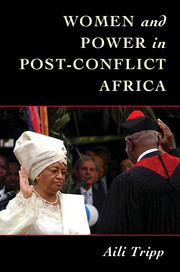Description
Women and Power in Postconflict Africa
Cambridge Studies in Gender and Politics Series
Author: Tripp Aili Mari
This book explains why women's rights are improving more rapidly in post-conflict countries in Africa than elsewhere on the continent.
Language: English
Subject for Women and Power in Postconflict Africa:
Approximative price 93.25 €
In Print (Delivery period: 14 days).
Add to cart
Women and Power in Postconflict Africa
Publication date: 10-2015
300 p. · 15.4x23.7 cm · Hardback
Publication date: 10-2015
300 p. · 15.4x23.7 cm · Hardback
Approximative price 30.20 €
In Print (Delivery period: 14 days).
Add to cart
Women and Power in Postconflict Africa
Publication date: 10-2015
320 p. · 15.3x23 cm · Paperback
Publication date: 10-2015
320 p. · 15.3x23 cm · Paperback
Description
/li>Contents
/li>Biography
/li>
The book explains an unexpected consequence of the decrease in conflict in Africa after the 1990s. Analysis of cross-national data and in-depth comparisons of case studies of Uganda, Liberia and Angola show that post-conflict countries have significantly higher rates of women's political representation in legislatures and government compared with countries that have not undergone major conflict. They have also passed more legislative reforms and made more constitutional changes relating to women's rights. The study explains how and why these patterns emerged, tying these outcomes to the conjuncture of the rise of women's movements, changes in international women's rights norms and, most importantly, gender disruptions that occur during war. This book will help scholars, students, women's rights activists, international donors, policy makers, non-governmental organizations (NGOs) and others better understand some of the circumstances that are most conducive to women's rights reform today and why.
Part I. Setting the Stage: Preface; 1. Introduction; 2. Pathways to change in political gender regimes; Part II. Case Studies: 3. Uganda: forging a new trajectory; 4. Liberia: the power of fighting for peace; 5. Angola: the limits of post-conflict gender policy reform; Part III. New Openings for Women's Rights: 6. Women's rights in peace agreements; 7. Women's rights in post-conflict constitutions; Part IV. Gendered Outcomes: 8. Women and leadership in post-conflict countries; 9. Women's rights and post-conflict legislative reform; Part V. Future Research: 10. New frontiers in the study of women, conflict, and peace.
Aili Tripp is Professor of Political Science and Gender and Women's Studies at the University of Wisconsin, Madison. She is author of several award-winning books, including Museveni's Uganda: Paradoxes of Power in a Hybrid Regime (2010), African Women's Movements: Transforming Political Landscapes (Cambridge, 2009), and Women and Politics in Uganda (2000). Professor Tripp is co-editor of the book series Women in Africa and the Diaspora. She has served as president of the African Studies Association and vice president of the American Political Science Association.
© 2024 LAVOISIER S.A.S.
These books may interest you

Women, Land and Power in Asia 172.36 €



